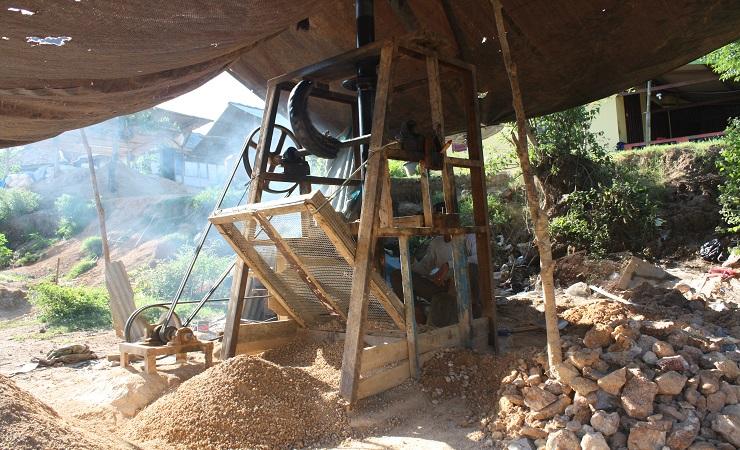ASIACALLING
At the mercy of mercury, Indonesian miners and their families at risk
"Illegal gold mining is rife across Indonesia. The big problem with these small-scale operations is mercury – the toxic heavy metal used in the extraction process."
Nicole Curby

Illegal gold mining is rife across Indonesia.
The big problem with these small-scale operations is mercury – the toxic heavy metal used in the extraction process that once used runs into nearby rivers and waterways.
From Lombok Nicole Curby looks at how often mercury is used, and the impacts it has on local communities.
Lombok’s spectacular volcanic hills are lined with picturesque beaches, coconut palms, and bright green rice paddy fields.
But the lush landscape is often interrupted by scabs in the earth, brown spaces razed of vegetation in the search for gold.
In clouds of dust, miners gamble with their lives in the hope of striking gold.
Working with limited resources, they organise in small groups and often opt for the cheapest and fastest method.
So miners often set up their operations in front of their homes, literally on their doorstep.
![]()
While less harmful methods are slowly being adopted, many miners still use mercury, which presents a serious health risk.
Dr. Ardiana Ekawanti is a medical researcher at the University of Mataram, and has been studying the mining community of Sekotong, in the southwest of the island, for more than five years.
“When we go to the field we see that almost every house do the mining, especially the amalgamation process, they do in their home,” she says.
“And what we are afraid about is involving children in this process. Because it’s a home industry, so the children help their parents to do some of their work. Maybe cracking the ore, or maybe pouring the mercury, and even burning the amalgam – some of the children do this,” explains Dr Ekawanti.
Miners even extract the gold by burning mercury in their kitchens, adds Dr Ekawanti.
![]()
It means the heavy metal seeps directly into their water supplies and the food chain, impacting the entire community.
“Not only the miner will be affected, but also the people around them. Like children, pregnant women, and the elderly. And we know that this community is susceptible to the toxic effects of the mercury,” says Dr Ekawanti.
When I visited the village of Sekotong, I was enthusiastically greeted by an excited mob of kids.
But when I asked them their ages, I was amazed by how young they seemed.
A government survey of the village revealed that 47% of school age children here showed signs of stunted growth, compared to 17% in the surrounding area of West Nusa Tenggara.
![]()
It’s unclear if there is direct between this stunting and the use of mercury.
But studies by two NGOs, BaliFokus and the Medicuss Foundation, have shown higher rates of delayed development and birth defects in areas where illegal mining is prevalent in Indonesia.
Yet even when miners are aware of the risks, they can still be lured by the higher wages, and the possibility of a big win.
Lombok miner Rian explains, “If we don’t work like this, we can’t make money elsewhere. It’s difficult. If we work in construction, we earn Rp50 000 (US$3.80) per day. But if we work here in the mine, we earn more. Sometimes we earn Rp150 000 ($11.50) for one day. So we can eat and drink.”
“We are not yet rich. But many people have become rich,” adds Rian.
Campaigns to raise awareness around the dangers of mercury have had some success so far, and there are some changes.
Rian told me that he and his wife now mine with potassium and carbon, using a method that is more time consuming, but safer than using mercury.
“According to the people, it is too dangerous if you use mercury. So we stopped. We are afraid. There are not yet sick children, but we are always cautious so that people don’t become sick. This is why we stopped using mercury,” Rian revealed.
![]()
But small-scale gold mining is a rapidly moving industry. When gold becomes hard to find, miners quickly move on to more lucrative areas.
Awareness of the risks don’t always move as quickly. That’s a constant challenge, says Budi Susilorini, the Indonesian director of the NGO, Pure Earth.
“In our project we have to make sure we don’t only talk with the miners because many of them aren't local people. It is very important to talk with the local people, the community leaders, with the local government institutions.”
“People move, new people come and new people have to be made aware of the dangers,” emphasized Susilorini.
![]()
In 2013 Indonesia signed the Minamata Convention to phase out the use of mercury.
Even though trade and use of mercury is illegal in Indonesia, the ban is rarely enforced. In fact, Mercury is now cheaper than ever, and easily accessible.
While some of the health effects of mercury take 5, 10, or even 20 or more years to be felt, mining villages across Indonesia are yet to experience the full impacts of widespread, small-scale gold mining.
- ASGM
- Nicole Curby
- Small scale gold mining
- Pure Earth
- University of Mataram
- Ardiana Ekawanti
- Sekotong Lombok
- Budi Susilorini
- Minamata Convention
Komentar (0)
KBR percaya pembaca situs ini adalah orang-orang yang cerdas dan terpelajar. Karena itu mari kita gunakan kata-kata yang santun di dalam kolom komentar ini. Kalimat yang sopan, menjauhi prasangka SARA (suku, agama, ras dan antargolongan), pasti akan lebih didengar. Yuk, kita praktikkan!